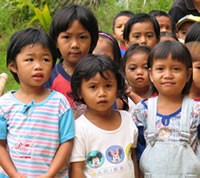The Bambam people trace their beginnings to the seven offspring of Pongkapadang and Torije'ne' who formed a confederacy called Pitu Ulunna Salu (Seven River Heads), which provided a united front against outside, hostile groups. The Dutch colonial government came in the early 1900s and brought schools, abolished slavery, introduced taxes, and brought Christianity. During World War II the Japanese sent troops to control the area, even though it was quite remote and not economically significant.
The Bambam area suffered further hardships from 1950 through 1965 - a time of raids and rebellion. A group of fanatical Muslim rebels took over the town of Mambi and began forcing people in other villages to convert to Islam. In response, the people of Bambam formed the Peoples' Defense Organization (Organisasi Pertahanan Rakyat). With assistance from the nationalist Battalion 710, the OPR attacked Mambi and drove the rebels back to the coast near Mamuju. After this, the 710 Battalion began abusing the people of the Bambam area, so the OPR forced the 710 to retreat. The OPR cut off all trails into the area, and continued to guard it until civil order was restored in 1964.
The majority of the Bambam people reside in the Mamasa regency in the highlands of West Sulawesi province of Indonesia. Villages are scattered throughout the watersheds of the Salu Mambi, Salu Dengen and Salu Mokanam rivers. It is a very mountainous region, with peaks reaching heights of up to 3000 meters.
Home and family are top priority to most Bambam people. The nuclear family consists of parents and unmarried children, but often a household includes elderly parents or newly married children. On the surface, relationships appear to be very harmonious. Anger is rarely expressed. Conforming, keeping the peace, and maintaining the status quo are cultural values. The people are generally very cooperative and sociable, which goes hand in hand with their way of working together. Whether it is preparing fields, planting, weeding, harvesting, repairing paths or building a house, people like to work with companions. Sometimes wages are paid, but often it is a matter of helping someone in return for their help at another time. The rice growing cycle is central to the Bambam lifestyle. Daily activities and planning are based on the cycle of repairing paddies, planting, weeding and harvesting. Feasts and ceremonies are also tied into this cycle. Tasks are clearly defined by gender.
While the rice growing cycle is central to the Bambam lifestyle, in recent years the economy has been most affected by the coffee and cacao crops. These provide the needed cash for purchasing goods brought in from outside.
There are three religious groups among the Bambam: the Christians (Protestant and Catholic), the Moslems, and the Mappuhondo (animists). The traditional beliefs of the Mappuhondo affect the beliefs of those who call themselves Christian or Moslem.
Traditionally, one finds favor with the gods by having penaba sambulo-bulo "straight breath". This is being good, which means caring for others, not lying, doing what one says they will do. The gods will not like it if you seek to destroy the plans of others. You need to look out for the good of others.
"Tometampa" the creator god made man, animals, plants, everything which is in the world. He is the creator god, but is not consider the boss of the gods. Each of the gods controls their domain (river, hill, village, type of work or task, etc). The Christians believe in the creator God and that He is in charge of all things.
When a Bambam person dies he goes sau' anitu "downriver to the ghost place" which is the place of the dead. People are not sure where that place is, "maybe at the edge of the world". The river is crossed (salu sidilambam), and they cannot go across if they have no water buffalo to pull across carrying all their belongings. That is why the family must butcher at least one water buffalo for their funeral.
Christians still butcher buffalos for funerals, but they say they do this because they'd be ashamed if they did not.
As farmers, their concerns are for their crops: insects and rats which can destroy them, and landslides which can sweep the crops and land away. Most of the terrain is difficult and the area remote, which is seen as a great handicap by the Bambam people. They feel that because the area is difficult to get to, government administrators do not really understand the Bambam area, the people, and their situation. Some Bambam people believe they are missing out on help which is available from the government because they live in such a remote area. With transportation a difficulty, prices for the coffee and cacao grown in Bambam are low. And prices for goods brought into the area are high. Medical facilities are scarce, frequently understaffed and undersupplied. These are all problems blamed partially on the mountainous, difficult terrain.
The Bambam New Testament and Genesis were published in 2004. Pray that the Scriptures will be read and applied to lives.
Gospel Recording of Indonesia prepared cassette tapes of the Gospel of John and the program "The Good News" in Bambam. Pray that these recordings will be well received and touch lives.
Political and religious tensions have disrupted lives in the Bambam region. Pray that these tensions will cause those who call themselves Christians to truly embrace Christ and that others would come to Christ through this difficult time.
Pray for revival among the adherents of Christianity, most of whom are cultural Christians.
Scripture Prayers for the Bambam, Pitu Ulunna Salu in Indonesia.
| Profile Source: Anonymous |










